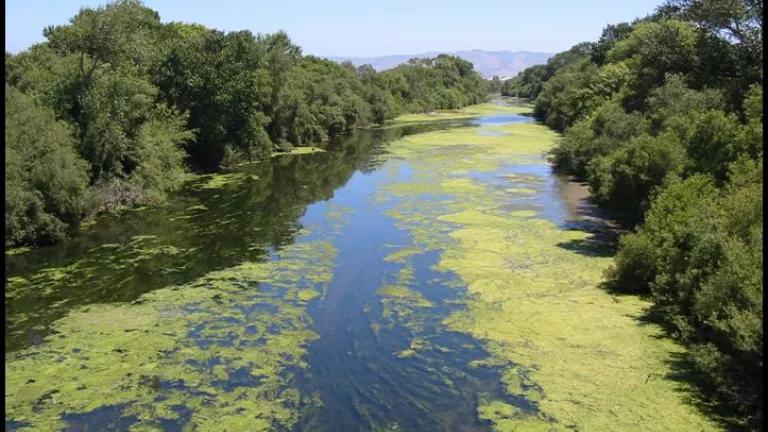Reducing Food Waste for the Climate, Nature, and People
Reducing food waste offers an opportunity to address climate change, biodiversity loss, human health, and racial justice.

A young child reaching for a pepper at the Santee Certified Farmers Market in Santee, California, May 2023.
USDA
Reducing food loss and waste offers an opportunity to address many of our world’s existential challenges, including combating the climate crisis and biodiversity loss, improving environmental health protections, and fighting racial injustice. The UN Food and Agriculture Organization estimates one-third of the food grown across the globe is never eaten. Food is wasted at every level of the supply chain because of strict cosmetic standards, mismatches in supply management, excessive portion sizes, and people simply forgetting excess food in the back of their refrigerators. By wasting food, we are squandering the environmental and economic resources that went into its production, including water, land, chemicals, energy, and labor.
Reducing food loss and waste is a unique issue requiring both individual and systemic actions. With the impending Farm Bill negotiations at hand, Congress must take advantage of this opportunity to include policies that will move the needle on food waste reduction. With the looming deadline for Climate Pollution Reduction Implementation Grant proposals, States, tribes, and regional governments should plan to build infrastructure to reduce and recycle food scraps to cut climate emissions. With the vast number of resources available through NRDC’s Food Matters toolbox of program and policy resources, cities can educate residents about preventing food from becoming waste, redistributing surplus food to neighbors, and recycling food scraps into nutrient rich soil amendment. Since 40-50 percent of all U.S. food waste comes from households, each of us has a compelling and impactful opportunity to inspect our own purchasing behaviors to reduce our own household food waste. Each of us has a role to play in reducing food waste and now is the time to act.
Food Waste Is a Climate Issue
Many communities are already seeing the effects of climate change through extreme weather events, sea-level rise, fishery collapse, worsening air quality, and increases in pests and infectious diseases. Many more will see devastating destruction of infrastructure, ecosystems, and loss of life if we do not curb emissions and stall the warming of our planet. However, few of us recognize the immense contribution wasting food has on our climate and our environment, nor do we fully realize how much our own actions can cumulatively improve the issue.
Wasted food is responsible for approximately 8 percent of global greenhouse gas emissions. Climate pollutants are emitted at every stage of food production including the production of synthetic fertilizers, the cooling and processing of food, and the transportation of food through the supply chain. When food is discarded in the landfill it releases methane, a super pollutant that is more than 80 times more potent than carbon dioxide in the short term. Reducing food loss and waste is an often-overlooked climate solution with the potential to avoid 100 gigatons of carbon dioxide equivalent emissions by 2050, Project Drawdown’s top ranking climate solution, the same as taking all of the world’s 1.5 billion cars off the road for almost 15 years.
Food Waste Is a Biodiversity Issue
Globally, deforestation and the destruction of forested land for livestock and crop production is a leading contributor to biodiversity loss. This is no different in the United States where grasslands, wetlands, and forests in many parts of the country, especially in the Northern Great Plains, are being converted to cultivated cropland despite the poor quality and low production yields of new fields. These habitats are critical for local and migratory species of insects, birds, small and large mammals, as well as native plants. We have enough food to feed our entire population, there is no need to expand cropland to produce more food, especially when most U.S. cropland grows feed grains when inedible food scraps could be used for animal feed instead. Reducing food waste could curb the pressure to expand cropland into wild places. Furthermore, industrial agriculture systems are depleting our soil and polluting freshwater systems in a way that is unsustainable for future food sustainability.
Food Waste Is a Health Issue
Despite growing enough food in our country to feed every person, 13 percent of American households face food insecurity at some point in the year. Food insecurity exists at different levels of severity and longevity, but all food insecurity is detrimental to people’s physical and mental health. Food insecurity is closely linked to diabetes, hypertension, mental health challenges, and behavioral problems in children. Furthermore, those struggling to obtain consistent access to quality, nutritious food, are often also struggling to afford adequate and appropriate health care thereby multiplying the impacts of food insecurity on health outcomes.
Rather than trashing good food, surplus food should be redirected to feed people. Wholesome food that goes unsold or unserved can be rescued and redistributed either through gleaning or donation of shelf-stable, perishable, and prepared meals from grocery stores and food retailers. In this way surplus food can meet the emergency food needs of people facing food insecurity. Food security is a critical component of improving people’s health.
Food Waste Is an Equity Issue
Neither the impacts of climate change nor food insecurity are felt evenly across all communities. Black, Indigenous, Latine, immigrant, and rural communities are hardest hit by both catastrophes. The structures of our society which have led to the racial disparities of food access, food quality, and food security are the same entrenched systems which have led to inaction on climate change. As we endeavor to reduce food waste, we have an opportunity to craft solutions which address racial equity as well as food security, a circular food system, and climate resiliency.
Reducing food loss and waste is an important environmental, social, and economic issue that requires all of us to commit toward improving. No matter our politics, our geography, or our profession, no one wants to waste food. There is no single way to fix food waste, rather there are numerous opportunities for each of us individuals, legislators, program implementers, and corporations to choose how we will change our wasteful behaviors and use our political and economic power to slow climate change, maintain biodiversity, support human health and racial equity. There has been some progress recently through President Biden’s infrastructure investments and the administration’s recently released National Strategy to Reduce Food Loss and Waste, but more needs to be done and Congress must not pass up this opportunity to address this important cross-cutting issue in the Farm Bill and other key legislation. Now is the time to act to reduce food loss and waste for our climate, our environment, and our health.



